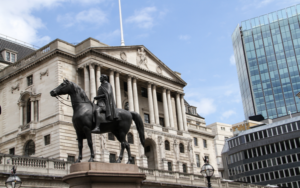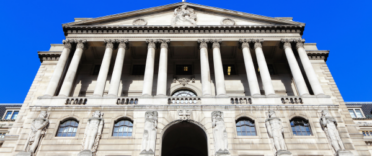
The Bank of England is the UK's central bank which was founded in 1694. It is a public body that answers to Parliament and as well as issuing legal tender in the form of banknotes, it works to ensure that the economy and cost of living remain stable in the UK.
In this article, we look at what the Bank of England base rate is, how the base rate is set and how the Bank of England base rate affects savers and borrowers.
What is the Bank of England base rate?
The Bank of England base rate is the interest rate that is set by the Monetary Policy Committee (MPC) in order to influence inflation in the UK economy. It is sometimes simply referred to as the 'base rate' or 'the interest rate' and is usually what people refer to when they speak of rising and falling interest rates.
The current Bank of England base rate is 4.75% - the most recent meeting of the MPC voted to cut the previous rate by 0.25%. The Bank of England base rate is set every 6 weeks or so and so it is reviewed around 8 times each year. The MPC meets a few days before a public announcement is made regarding the outcome of the meeting.
The next Bank of England base rate meeting will take place according to the MPC's base rate review schedule. The Bank of England base rate will be assessed within the context of inflation and the MPC will decide whether the rate can remain the same, needs to be increased or is potentially lowered. The outcome of the next MPC meeting outcome is dependent on market conditions such as the rate of inflation and economic stability making it difficult to predict exactly what base rate change will be made. However, you can read our latest interest rates forecast to understand this more.
How is the Bank of England base rate set?
The Monetary Policy Committee will review data gathered from banks and building societies as well as credit unions, insurers and mortgage lenders. Based on this data and keeping financial stability in mind, the members of the committee will vote for the change they believe is needed and the votes influence the final decision on what the base rate will be set at.
How does the Bank of England base rate affect inflation?
The MPC works towards meeting the Bank of England's target of keeping inflation at 2% and uses the base rate to increase and reduce demand in the economy. Reducing demand for spending can slow an economy and reduce the rate of inflation while increasing it will do the opposite. Whilst that may seem simple, growth is also important and the BoE are responsible for making just the right amount of change to the base rate in a timely fashion to influence the economy positively.
How does the Bank of England base rate affect mortgages?
Although mortgage interest rates are set by lenders, they are influenced by the base rate set by the Bank of England due to how the base rate affects other types of lending. Most lenders borrow from financial institutions at rates known as swap rates where the lender and the institution will swap a fixed rate for a variable rate. Swap rates change in line with the base rate charged by the Bank of England so when your lender has to pay more or less for borrowing the money it lends to you in the form of a mortgage, it will inevitably affect what it charges you for doing so.
When the BoE base rate rises steadily, lenders will usually increase rates to reflect the added cost to them ensuring they maintain their profit margins but it is also possible for lenders to withdraw lending if rates rise suddenly.
Get a FREE mortgage review
Our partner Vouchedfor will help you get the best mortgage rate with a free mortgage review
- From a 5-star rated mortgage adviser
- Typically save £80 per month per £100,000 of your mortgage
- No obligation
How the BoE base rate affects fixed rate mortgages
Fixed-rate mortgages charge an interest rate that is fixed for the duration of the mortgage deal which is usually between 2 and 10 years. During this period, any change to the base rate will not affect the interest rate you pay therefore your monthly payment will not change.
Once your fixed-rate period ends and you seek a new mortgage deal, you will find that new deals reflect the BoE base rate at the time and may change your monthly mortgage payment. If you choose not to switch mortgage deals, your mortgage will revert to the lender's standard variable rate (SVR) and the base rate will usually affect a lender's SVR. What this means is that a change to the base rate will eventually transpire in the interest you are charged for your mortgage loan.
If you are coming out of a fixed-rate deal, you can search current mortgage rates using our Mortgage rate comparison tool which searches over 90 lenders' mortgage deals for your needs.
How the BoE base rate affects tracker mortgages
A tracker mortgage is usually directly affected by any change to the BoE base as the interest rate tracks this. Almost all tracker mortgages track the BoE base rate - some track the LIBOR rate which is affected by the BoE base rate too. Tracker mortgage interest rates work by charging a fixed amount of interest plus the rate that is being tracked. This means that any change to the base rate will be reflected in your monthly mortgage payments immediately.
So, in a nutshell, if the BoE increases the base rate, the interest you pay on your mortgage will normally increase too and if it falls, your mortgage interest rate will likely fall too.
How does the Bank of England base rate affect savings rates?
The base rate affects what is paid to financial organisations such as banks and building societies for the financial products that they hold. If the base rate changes then this affects what the bank passes on to its savers - a fall in the base rate may mean that banks offer savings customers less interest on their deposits while an increase will usually prompt them to increase the interest paid to savers, encouraging them to save more.
Increases to the base rate of interest may not be experienced immediately when it comes to the interest that you are paid on savings but they generally materialise due to the banks' need to remain competitive so you continue to invest your savings with them.
Between lending money and holding money for customers, banks need to make a profit and the profit margins will be directly affected by the base rate. You can compare the best savings rates in the market right now in our Savings Best Buy tables.
How does the Bank of England base rate affect credit cards, overdrafts and loans?
If you have a credit card or loan with an agreed interest rate, a base rate change is unlikely to affect this until your agreement period ends. You may experience a change to the rate of interest charged on any credit balance once your agreement period ends or if you apply for new credit. Credit providers are likely to pass on any change in the BoE base rate to borrowers but you should still search the market for the best deals to compare interest rates and other terms of credit before applying for a new credit card or loan. You may even be able to transfer the balance of your credit card or loan to another provider that offers you a more competitive interest rate and some may even offer a 0% balance transfer offer. If you have an arranged overdraft, your bank or building society will write to you to make you aware of any changes to the rate of interest charged on your overdraft balance.





